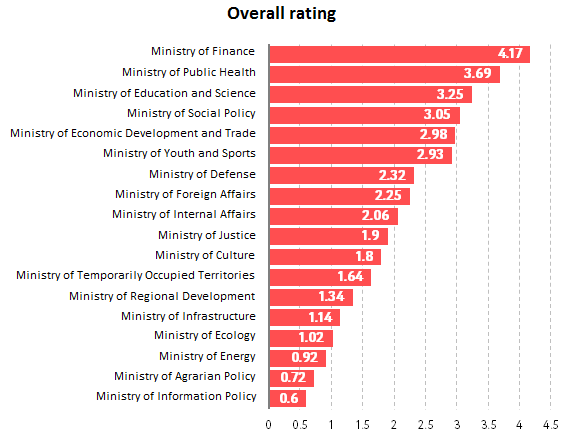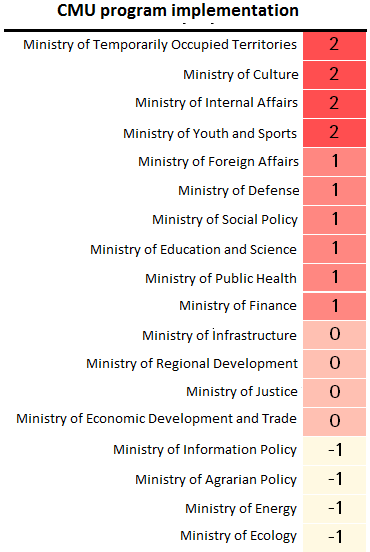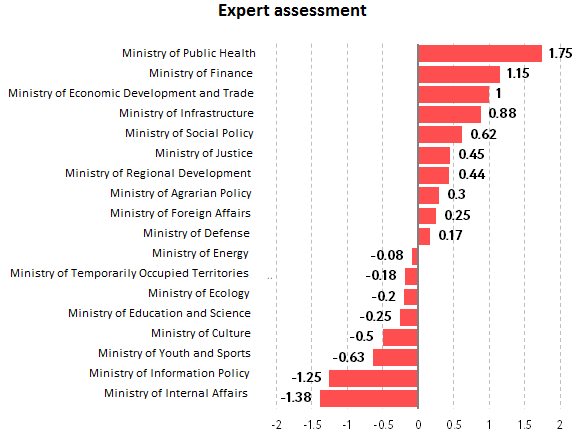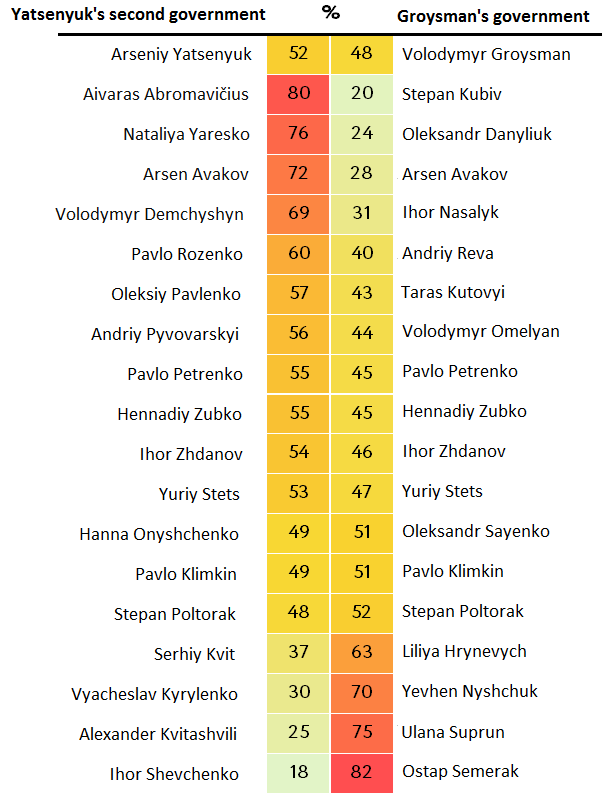The VoxUkraine team of experts calculated a new performance rating of the Ukrainian ministries. Earlier similar assessments can be viewed here.
The first year of Groysman government ended in mid-April. We analyzed how successful each of the ministries have been in implementing their key tasks for 2016; independent experts also provided their assessment. Moreover, we conducted a large-scale survey among the readers of leading business and political media, asking them to compare the work of current ministers with their predecessors in Yatsenyuk government.
The overall assessment was made in accordance with a previously developed methodology and included the following components:
- evaluation of the Cabinet of Ministers (CMU) program for each ministry;
- evaluation of the CMU program implementation;
- expert evaluation of conducted reforms;
- the ministries’ response to VoxUkraine’s request for information
For each component every ministry was awarded from -2 to 2 points. The ministries that responded comprehensively to VoxUkraine’s request for information received additional 0.5 point.

The VoxUkraine team of experts calculated a new performance rating of the Ukrainian ministries. Earlier similar assessments can be viewed here.
The first year of Groysman government ended in mid-April. We analyzed how successful each of the ministries have been in implementing their key tasks for 2016; independent experts also provided their assessment. Moreover, we conducted a large-scale survey among the readers of leading business and political media, asking them to compare the work of current ministers with their predecessors in Yatsenyuk government.
The overall assessment was made in accordance with a previously developed methodology and included the following components:
- evaluation of the Cabinet of Ministers (CMU) program for each ministry;
- evaluation of the CMU program implementation;
- expert evaluation of conducted reforms;
- the ministries’ response to VoxUkraine’s request for information
For each component every ministry was awarded from -2 to 2 points. The ministries that responded comprehensively to VoxUkraine’s request for information received additional 0.5 point.

- Only four ministries managed to achieve a CMU program completion rate of more than 80%;
- The Ministry of Culture implemented 100% of the CMU program, however, the total number of objectives declined twofold over the course of one year: from 10 to 5. Thus, the program completion rate may have been as low as 50%, but as we were analyzing the final version of the CMU program, the ministry scored 100%;
- four ministries were only able to achieve a CMU program completion rate of 40% or less. These include the Ministry of Infrastructure (40%), the Ministry of Energy (33.33%) and the Ministry of Agrarian Policy and Food (25%).
Expert assessment of the progress of reforms

Note
The assessment was performed using the following scale:
1. Maximum efforts to pursue the course of reform: 2 points
2. Occasional efforts to pursue the course of reform: 1 point
3. Discharge of current duties only, with no attempts to introduce reforms: 0 points
4. Mediocre discharge of duties, sabotage of reforms: -1 point;
5. Poor discharge even of current duties, not to mention implementation of reforms: -2 points.
- According to the experts, in 2016 significant progress in reforms was demonstrated by the Ministry of Public Health (1.75 points), the Ministry of Finance (1.15), and the Ministry of Economic Development and Trade (1.00);
- The notable achievements of the Ministry of Public Health include the drug procurement reform and the launch of the medical reform; the Ministry of Finance was complimented for its balanced budget policy and attempts to reform the tax militia and the customs service; the Ministry of Economic Development and Trade was praised for deregulation and further improvement of ProZorro;
- The worst performing Ministry, in terms of delivering and implementing reforms, was the Ministry of Internal Affairs with -1.38 points. The experts noted that the only real reform implemented by that ministry was the creation of the patrol police. Among the worst performing ministries ended up the Ministry of Information Policy (-1.25) and the Ministry of Youth and Sports (-0.63).
“Groysman vs Yatsenyuk: whose government is better.” Public opinion survey (Survey results were not included into the overall assessment of the ministries)
For the first time, VoxUkraine conducted a new type of survey questioning broad groups of population (readers of Ukrainska Pravda, Liga.net, and VoxUkraine’s Facebook page). In this survey, we did not ask the respondents to assess ministries’ performance; instead, we asked them to choose who is better: the current minister or his/her predecessor from Yatsenyuk second government (December 2014 – April 2016). In case the minister was the same (e.g. the heads of the Ministries of Internal Affairs and Foreign Affairs), the respondents were to specify the government in which they thought the minister did better. Survey participants were required to provide following information about themselves: age, gender, level of interest in politics, size of the city/town of residence, and income.
More than 1,200 respondents took part in the survey. That said, our survey is not representative, as any other online survey.
What do people say?
Survey results show that Ukrainians see the past in a more favorable light than the present. For example the support rating for Yatsenyuk at the time of his resignation was twice as low as the current level of support for Groysman, that, however, did not prevent the former head of the government from getting more votes than the current leader. Eventually, Yatsenyuk received several dozen more votes than his opponent gaining 52% against 48%. Notably, Groysman leads among the respondents with a monthly income of 5,000 to 10,000 UAH and is even more favored by those whose income exceeds 15,000 UAH. Yatsenyuk’s “support groups” have income of either less than 5,000 UAH or between 10,000 and 15,000 UAH.
On the whole, the “popular” vote placed the former government in the first place, with 12 ministers from Yatsenyuk cabinet getting a majority of the votes, against 7 winners in Groysman government.
- Weakening of the economic bloc
Regardless of age, income, level of interest in politics and place of residence, respondents consider the former economic bloc ministers to be better than the new ones. The undisputed favorite is the ex-Minister of Economic Development Aivaras Abromavičius – he received four times as many votes as his successor Stepan Kubiv. Quite similar is the situation with the Minister of Finance: the number of supporters of Nataliya Yaresko is three times higher than those of Oleksandr Danyliuk. That is a somewhat unexpected outcome, given that the Ministry of Finance under Danyliuk rose to the very top of the overall ranking.
Under Yaresko, the Ministry of Finance restructured the country’s foreign debt and initiated the reform of the tax and budget systems. Under Danyliuk, according to iMoRe (Index for Monitoring Reforms), the Ministry’s main achievements include legislative initiatives aimed at improving business conditions: the introduction of automatic VAT refunding and the launching of the “single window system” at the customs.
Under Abromavičius, the greatest achievements of the Ministry of Economics consisted in deregulation and state procurement reforms. These included the law on protection of investors’ rights, the laws on state and public procurement, the elimination of the monopoly of the SE Ukrekoresursy, the law on deregulation, and the abolition of mandatory certification of a number of products. Under Kubiv, a series of normative acts were initiated that were aimed at simplifying the business climate and at reforming state enterprises.
- Women start and win
In the respondents’ view, the female ministers in Groysman government performed better than most of the male ministers did. Thus, Ulana Suprun, the new head of the Ministry of Public Health, received three times as many votes compared to her predecessor Alexander Kvitashvili. The new team was much more efficient in promoting public health reforms: the Ministry of Public Health succeeded in lobbying for the law on autonomization of medical institutions, which was passed by the Verkhovna Rada (No. 2309a-d); it also started developing the medical electronic system eHealth and introduced compensation for the cost of medicines for three categories of patients. Under Kvitashvili, who spent half of his term in office trying to retire, there were no reformist achievements of this sort.
However, our respondents were not always consistent in their judgment. For example Serhiy Kvit as Minister of Education is remembered for the adoption of the new Law “On Higher Education.” The new minister Liliya Hrynevych has not scored any similar achievements yet; but she has a clear advantage over Kvit: 676 votes against 399 (remarkably, the age group that most students belong to also supported Hrynevych).
Moreover, the majority of ministers serving the second term in office should re-evaluate their performance and substantially accelerate the pace of reforms. Five of them scored significantly less than a year ago. The biggest “loser” was the Minister of Internal Affairs Arsen Avakov, with only 28% of the respondents saying he was doing a better job in Groysman government compared to his work under Yatsenyuk. The only “old” ministers whose popularity did not diminish were the Minister of Defense Stepan Poltorak and the head of the Ministry of Foreign Affairs Pavlo Klimkin.

Overall, the analysis revealed that the ministries’ efficiency is greatly influenced by the individual qualities of the head and/or his/her team (key deputies). This signals a lack of well structured processes within the ministries.
Main photos: depositphotos.com / palinchak
Attention
The authors do not work for, consult to, own shares in or receive funding from any company or organization that would benefit from this article, and have no relevant affiliations


